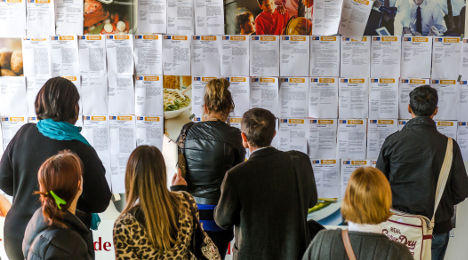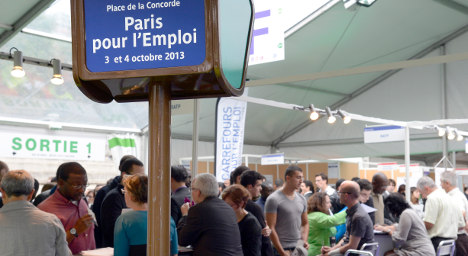Forget all doom and gloom surrounding France’s record unemployment level for a moment, because there are jobs out there, thousands of them in fact.
With record numbers of jobseekers, including expats, looking for work in France these days, this week’s job fair at Place de la Concorde in Paris could be just the opportunity many are looking for.
The annual convention – the biggest in France – named Paris Pour l'Emploi (Paris for work), will bring together 2,000 recruiters from top French companies, and thousands of qualified and ambitious job-seekers.
“It’s a public forum that is valuable for the both new as well as experienced candidates,” said event organiser Michel Lefèvre from the association Carrefours Pour L’Emploi.
Organisers say there will be 10,000 jobs up for grabs over Thursday and Friday although that’s 5,000 less than the posts that were available last year.
An effect organisers say is down to the ongoing financial crisis.
It won't however be nearly enough to satisfy the growing number of unemployed (people with no work at all) in the French capital which now stands at 143,200, compared to 134,700 this time last year.
With thousands of job hunters expected to turn up over the two days, competition for the vacancies will be tough.
International companies from all over Europe will be present once again at the fair so multi-lingual candidates and native English speakers may find roles appropriate to the skills.
SEE ALSO: Six quick tips for finding a job in France

Organisers are advising jobseekers to be picky when it comes to seeking out recruiters.
“Candidates need to target their searches so they don’t waste their time,” says Lefèvre.
“And don’t arrive empty handed they need to bring with them some up-to-date CVs that are perfectly readable and comprehensible,” he adds.
No advanced booking or registration is required and admission is free. Jobseekers should be prepared to walk to find work however, with the fair spread out over 1,000 square metres. A section of the forum will be dedicated to disabled candidates who are looking for work.
And it’s not just all for show. In 2012 nearly 5,000 jobs were filled and candidates handed out around six CV's each on average.
The job fair comes as it emerged recently that there are 350,000 vacancies in France that the country’s national job agency Pôle Emploi are having a hard time filling.
It prompted the country’s Labour Minister François Rebsamen to order the leadership of the Pôle Emploi to "reinforce checks" to make sure benefit recipients are in fact "looking for a job," he told i-Télé.
Anyone with questions regarding the job fair is advised to call 01-53-95-15-15. Otherwise, make your way to Metro stop Concorde or Assemblée Nationale between 9am and 6pm on Thursday and Friday, armed with a CV and a firm handshake.
Metro: Place de la Concorde. Lines 1, 8 and 12
Visit: www.carrefoursemploi.org



 Please whitelist us to continue reading.
Please whitelist us to continue reading.
Member comments